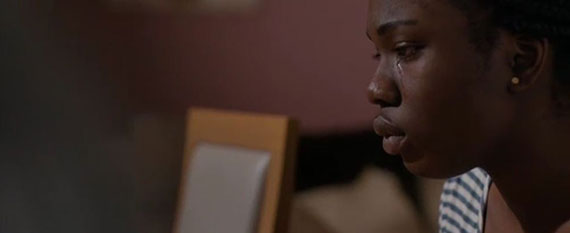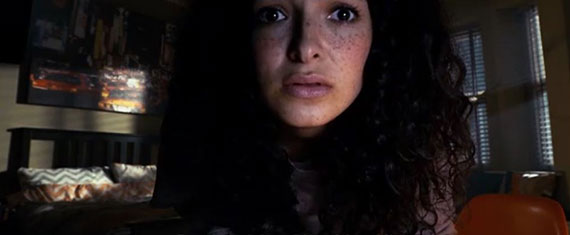Class: Episode 3 “Nightvisiting” Review
Clint Hassell gives his verdict on the third episode of Doctor Who’s new spin-off.

Note: this review contains full spoilers for the third episode, available on BBC3 now.
“Nightvisiting” contains almost no action and only the most rudimentary of special effects, instead separating the cast into a series of insular dialogues that are both wordy and weighty. The episode not only directly duplicates the opening of “The Rings of Akhaten,” it even copies that story’s resolution.
However, “Nightvisiting” is also deftly scripted and tightly plotted, perfectly capturing the ethereal temor of a 3 AM waking dream and exceeding its premise to stand as a shining example of the best that Doctor Who has to offer. The episode is not just a defining point for the characters of Class, but for the series as a whole.

“It isn’t you.” Despite being the episode’s third line of dialogue, this is really the defining moment for Tanya’s character. “You’re not him,” she insists to the man sitting in front of her. Tanya is smart. Smart enough to skip two years of school, to question Coach Dawson and not be intimidated. Smart enough to realize, regardless of her grieving heart, that something is not quite right about her father’s sudden reappearance, and to not immediately embrace his return, literally or figuratively. Even when “Jasper” is able to recount personal stories about her childhood, Tanya reasons, “That just means that you can read my mind. That doesn’t mean that you are actually . . . you.” Note that this is the first time that Tanya refers to the Lan Kin as actually being her father. It is beginning to convince her, which greatly increases the episode’s tension, as the thought of Tanya reaching out for him now becomes frightfully real. Actress Vivian Oparah believably portrays the desire in Tanya’s eyes and the hesitation in her motions, and it is to her credit that Tanya’s final “YOU. ARE. NOT. MY. FATHER!” feels totally earned.

Despite Tanya’s development, the character that most benefitted from the episode’s format is April, who announces that she is neither “nice” nor “sensible,” but is, in fact, waging a war against the turmoil left in the wake of an absent, alcoholic father. It’s a subtle reveal, but references something learned in the series premiere – – that, while Charlie, Ram, and even Tanya have, until fairly recently, led relatively stable lives, April’s life has been chaotic and damaging for years. She only seems better adjusted, not because she is nicer, but because she’s had longer to temper her heart in life’s forge. Her message to Ram is that letting the bully continue to govern your life, even after they are gone, gives them even more control than they could ever take from you. April shows exceptional maturity, illuminating why she relates best to Charlie, who is also having to shoulder the adult responsibility of safeguarding the souls of his people.
Note that April only connects to Ram after he chooses, in the previous episode, to grow from his experience with the Shadow Kin. It’s great to see that, though all four kids are friendly, they have paired off – – Ram and Tanya bonding over their respective losses, Charlie and April over the threat of the Shadow Kin. This is a natural part of relationships; people get pulled into a social circle for a myriad of reasons, and it is unrealistic to expect that everyone is equally close with everyone else. Yet, so often, this is how relationships are portrayed in fiction, with pairings more dictated by situation and plot necessity that changes from week to week. Seeing Ram and April coupled together and struggling with communication – – even arguing over who is better friends with Tanya – – not only fleshes out their respective characters, but also adds depth to the larger group dynamic.

In addition to affording increased character development, the slow burn of “Nightvisiting” actually benefits the science fiction aspects of the premise, as the Lan Kin’s true nature is revealed organically through dialogue, rather than awkward exposition. The audience is provided just enough details – – they use “morphic resonance” to mimic the deceased, and “go to the strongest pull first,” but are unable to merely capture their prey because “souls can never be forced, only persuaded” – – to piece together the Lan Kin’s motives and methodology. Are the Lan Kin reliable narrators? No, and that’s acceptable because, plot-wise, the Lan Kin only serve as the framework around which the episode’s two philosophical discussions are constructed.
Matteusz: “Do you have love where you come from?”
Charlie: “On my world, love is a practical term, it’s almost a business one. It means ‘to combine what you have with what someone else has.’ It’s the combination that means love, not the wish to do it.”
“Nightvisiting” most effectively uses its sci-fi premise to examine the human concept of love, by comparing it to its Rhodian counterpart. This not only allows for character growth as Charlie is challenged to reconcile Matteusz’s feelings to his own, but his specific words subtly suggest an uncomfortable truth not revealed in “For Tonight We Might Die” – – that, because he was gay and, ostensibly, less likely to produce an heir to the Rhodian throne, Charlie was unloved by his family. “My family, they never saw me as someone they needed to bother combining with. I was a valuable piece of property to be used for the good of the country.” Note how deftly “Nightvisiting” turns a dialogue about the nature of love into a pointed parallel of parental disapproval. Where Matteusz’s Polish parents reject their son’s homosexuality on religious grounds, Charlie’s object for biological and political reasons. The conversation is brought full circle as Charlie reminds Matteusz that, on Earth, “choice” can also mean the ability to define one’s own family, a sharp contrast to the opportunities Charlie must have had, as a Rhodian prince.
Miss Quill’s conversation with her “sister” is no less revelatory, as the concept of an afterlife is examined through an alien lens. “Quill don’t have souls,” Miss Quill states. “We do, we just believe they die with us. We’re wrong about that,” remarks her sister, describing Heaven as “being with the souls of everyone you ever knew.” “Sounds like Hell,” retorts Miss Quill, who recognizes the message as “suspiciously sentimental – – exactly the sort of nonsense that would lead one of these ridiculous humans into a trap.” Many cultures tie one’s behavior in life to one’s fate in the afterlife. For Class to postulate Heaven and Hell as the exact same place, the experience differing only in how it would feel to be bound forever by the relationships you fostered in life, is revolutionary and thought-provoking.
Quill’s dialogue with the Lan Kin reconfirms a running theme with Miss Quill – – that she is lonely, and grieves the loss of her people even more than Charlie, who has tempered his emotions out of a sense of responsibility to his role as Rhodian prince. This culminates in Quill’s defining moment in Class, thus far, a pained look on her face as the stands excluded by the others, despite having been the ultimate cause of the Lan Kin’s retreat. It’s fantastic to finally see some development of Quill’s character that isn’t buried under a comedic subplot.

It is to writer Patrick Ness’ credit that his script for “Nightvisiting” is so densely packed with ideas that there is not room to explore every interesting topic. The notion that humans are “a species so in love with closure” is tantalizingly unexamined, and conflicting hints are given regarding Ram’s current state of being. Considering the alternative, too many ideas is a wonderful problem to have!
Truly great science fiction uses its otherworldly premise as a backdrop for discussing truths about the human condition. “Nightvisiting” capitalizes on its unconventional format to examine the natures of grief, love, and strength of character, compare varied concepts of family and the afterlife, and investigate the notion of belonging, making the episode a stellar example of what science fiction can accomplish. This Class earns top marks.








